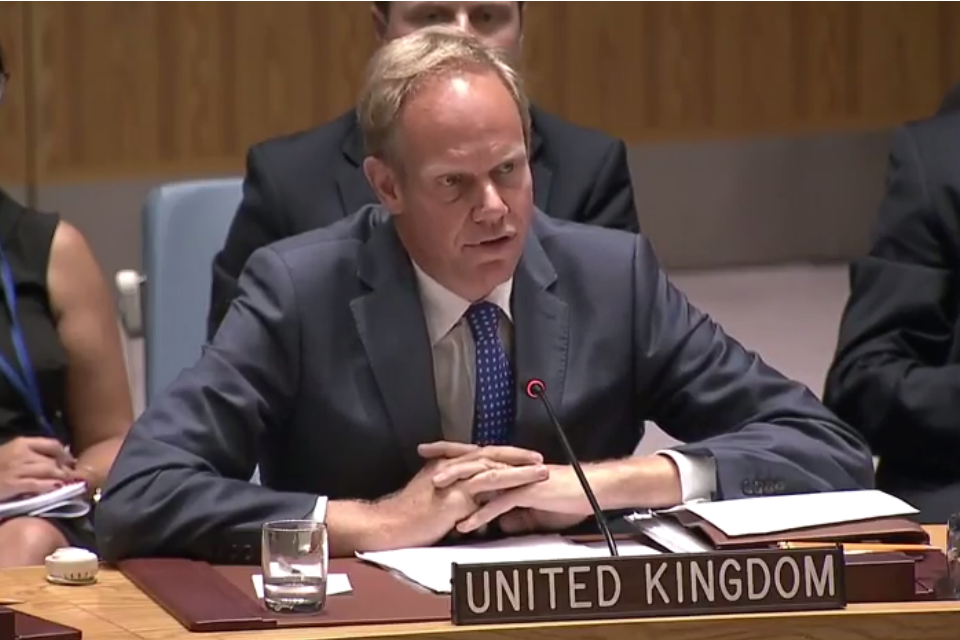"This is the reality of life today in Syria"
Statement by Ambassador Matthew Rycroft, UK Permanent Representative to the United Nations, in UN Security Council Meeting on Syria

Thank you Mr. President, thank you Stephen, and thank you to all the humanitarian workers trying to do their jobs as best they can in Aleppo and the rest of Syria.
We gather in this chamber every month and we routinely reduce the situation in Syria to simple statistics. Statistics like 400,000 killed, over 2 million injured, millions more forced to flee.
A number you don’t hear often in Syria is zero. But that’s the number I’d like to focus on today. That’s the number, the exact number, of aid convoys that have reached besieged and hard to reach areas this month. Zero.
We sat time and time again in the comfort of this chamber and agreed on the need for humanitarian assistance to reach those in need. And yet zero crates of food have arrived in Aleppo and zero medical supplies have arrived to replenish the makeshift hospitals that care for civilians.
As the Secretary-General’s report makes clear, four of those hospitals - as well as the Central Blood Bank - were hit by airstrikes in eastern Aleppo city on the 23rd and 24th of July. There is zero justification for those attacks. Either these facilities are being directly targeted or airstrikes are being conducted with deliberate disregard for civilians on the ground. Both scenarios are wholly inexcusable.
And yet, it gets worse. Human Rights Watch reported last week that the joint Syrian-Russian air campaign has violated international law by dropping incendiary munitions on civilian areas.
A single occurrence of that would be unacceptable. And yet the report says that this has happened twice a week on average for over two months. These weapons have no place in war. And urban spaces in Syria are clearly not an exception. I call on Russia to end the use of these weapons in the air campaign and to use its influence on the regime to end all attacks on civilians.
The list of heinous weapons being deployed in Syria sadly does not end there. Over half a year after the destruction of Syria’s declared chemical weapons stockpile, reports now suggest that there is a resurgence of chlorine gas attacks in Idlib and in Aleppo. Is there a more sickening way to mark the third anniversary of the gas attack in Ghouta?
So let us all be clear. The use of these weapons is abhorrent and we unequivocally condemn those who unleash them. Later this week we will have the opportunity to hear a fuller picture when the UN/OPCW Joint Investigative Mechanism reports. This Council must stand ready to demonstrate a robust response to this report, whatever the findings.
All these horrors that I’ve just described; this is the reality of life today in Syria; of life today in Aleppo. Those committing these horrors have a responsibility to change this reality, and yet they show no willingness to do so.
So let me spell out for them what they have to do. First, stop the bombing, stop the indiscriminate attacks on medical facilities and civilians. Second, guarantee safe and sustained access for humanitarian agencies. Third, resume political talks. It is really that simple.
The United Nations call for weekly 48 hour pauses to get aid into Aleppo is a step forward; we fully support it. This could ensure that those in dire need of medical evacuation can access medical treatment. And with Russia’s indication of support for this initiative, I hope we can all now agree to it. I also hope that we can all agree to the points just put forward by New Zealand, Spain, and Egypt. I certainly do.
I started this intervention with some statistics, but sometimes a statistic can’t show the true human impact of conflict. If any of you have been on social media or watched the news this week, you will know the name and face of Omran Daqneesh; the stunned, bloodied, terrified little boy sat in an ambulance having narrowly escaped death. As Stephen reminded us, his brother, and hundreds of thousands of his fellow Syrians, were not so fortunate.
Omran has become the human face of the Syrian conflict for millions around the world. But we must not forget that there are 13 and a half million faces in Syria just like his. The faces of men, women and children in desperate need of humanitarian assistance. And we can help deliver that. The United Kingdom stands ready to play our part. I implore each and every one of you to do the same.
Thank you, Mr President.